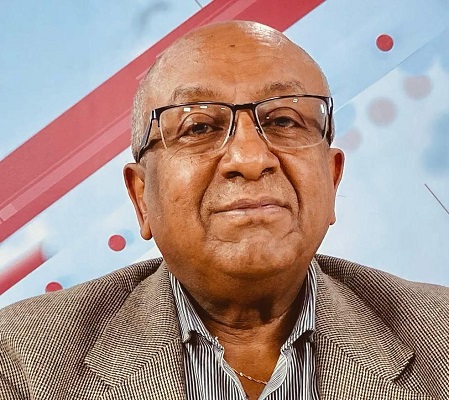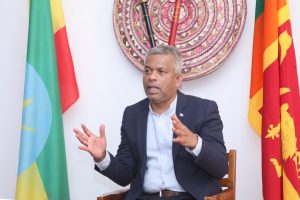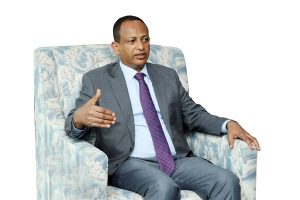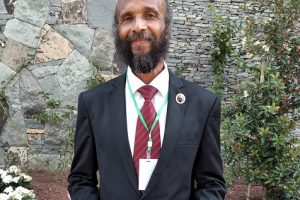
Our today’s guest is Professor Brook Hailu Beshah. He served in North Carolina State University, Department of Political Science, and an online adjunct professor at the Scripps School of Journalism, Ohio University. He has 30 years of lecturing experience in political science and international relations and years of foreign policy and diplomacy experience in bilateral and multilateral fora.
In his diplomatic life, he was Ethiopia’s special envoy, Minister Plenipotentiary, D/Ambassador of Ethiopia to the United States. He also worked at the UN in Paris/UNESCO. He is also president of the recently established Ethiopian Diplomatic Association. Enjoy reading!
How do you appraise Ethiopia’s give-and-take diplomatic strategy in the pursuit protecting its national interest?
Ethiopia’s diplomatic activity has not come forth suddenly; it could be traced back to centuries. The country boasts an age-long diplomatic history, or it has been engaged in diplomatic activity for thousands of years. The diplomatic relations we had with Rome during the period of King Kaleb could be a case in point in this regard. Over the last 150 years, Ethiopia has been actively engaging in diplomatic relationships with many countries.
During the period of Emperor Haileselase I, Ethiopia had a strong diplomatic activity, when compared with its predecessors. Over the past five years, Ethiopia’s diplomatic activities have been far greater than in previous times as well.
The Horn region lacks peace and Ethiopia is central in terms of its strategic position. Diplomatic activities in the region have a direct or indirect bearing on Ethiopia’s interests. The reverse is also true: The neighboring Somalia, Kenya, Djibouti, Eritrea, Sudan, South Sudan, and Somaliland are intertwined in one way or the other.
Presently, our diplomatic activity is at its peak. One of Ethiopia’s principles is creating sustainable tranquility with its neighbors. Ethiopia upholds firmly the international principle of creating peaceful coexistence.
Given the facts about Ethiopia such as its large territory, huge population number and expanding economy, the country could play a pivotal role in the region. Credible international institutions forecast Ethiopia’s economy as one of the fastest growing in Africa, which is the reflection of the thriving diplomatic activity. Consequently, the achievements of Ethiopia would create a positive impact on its neighbors. Ethiopia, in while safeguarding its national interest, pursues a policy of win-win approach, which is very important for the region and beyond. Ethiopia should also create a lasting peace internally.
Because the East African Region is at times volatile, it is expected that one of the agendas of the AU could focus on Ethiopia’s quest to have access to the sea and its relations with Ethiopia, Somaliland, and Egypt.
Can you share with me what is expected of our diplomats?
I believe Ethiopia needs to have trained, professional and proficient diplomats, who are equipped with the ability to encounter emerging issues. We need to have well-disciplined diplomats with a strong moral compass, who put the country first.
Ethiopia’s MoU with Somaliland has made headlines on international media. Do you think the signing of the agreement goes against the interest of Somalia?
Over the past 30 years, Ethiopia has no access to the sea. Ethiopia had its own port in earlier times. The previous government has made historical mistakes. The previous Ethiopian government could have negotiated access to the sea.
Consequently, the country is exposed to the present state of affairs. The United Nations Conventions and the law of the sea would permit them to access the sea. About 44 countries in the world are landlocked and do not have access to the sea. Ethiopia, a country with over 120 million people, is the most populous of the landlocked countries. Kazakhstan is another country, that is landlocked, that has a vast territorial landscape.
European countries such as Austria, Switzerland, and Luxembourg are landlocked countries, but have no access to the sea. Accordingly, they use the Rhine and Danube Rivers to import and export goods. Unfortunately, Ethiopia has no river that connects it to the sea. In the case, where Ethiopia decides to construct a tunnel, it requires the consent of Eritrea. The MoU signed between Somaliland and Ethiopia, which is initiated by Prime Minister Abiy Ahmed (Ph.D), should be supported, appreciated and recognized as a bold move by Ethiopia to address its quest to have access to the sea.
It goes without saying: Ethiopia has considered various sea ports and has also conducted studies on the possible options before deciding on Somaliland.
Ethiopia has chosen Somaliland as the best possible options for access to the sea. Ethiopia’s request to have access to the sea outlets is based on the willingness of Somaliland.
When we come to the AU for instance, there are some countries that believe in the importance of accepting colonial boundaries. Somalia joined the AU after the unification with Somaliland; When we talk about present-day Somalia, it includes Somaliland. Currently, some countries opened representatives and consulates, such as Djibouti, Egypt, Denmark, Turkey and Ethiopia. This, I believe, is a de facto recognition of Somaliland.
Somaliland has existed as an independent country for the last 33 years. Not recognizing this fact can be considered as denying the reality. The bold move of Ethiopia to directly interact with Somaliland, I predict, would be followed by other countries to eventually recognize Somaliland as an independent country.
The MoU between Ethiopia and Somaliland would eventually be followed by a detailed and comprehensive agreement in regard to access to the sea. It might be difficult for the AU to take a position currently.
It should be understood that Ethiopian soldiers under AMISOM are in Somalia since 2007, which was replaced by ATMIS in 2022. Ethiopia has played a greater role by joining AMISOM as a peacekeeping force, playing a pivotal role in the maintenance of peace and security in Somalia and lifting Somalia out of the category of “failed state”. Considerable number of Ethiopian soldiers given up their life for Somalia, fighting Alshabab and in the maintenance of peace and security in Somalia. Be it Somaliland, Somalia or Ethiopia: In this globalized world all of the countries are aspiring to bring about regional economic and political integration in the Horn.
How can Ethiopia create awareness of entities about the Sea Access to get more supports?
That is a key question. We need to reflect on the following important points: Given Ethiopia is a country with a total population of 120 million and a wider territory, any sort of politics that does not recognize Ethiopia’s right to have access to the sea will not be successful. If Ethiopia has access to the sea, it is an opportunity to register integrated economic growth among countries in the Horn. It can play an enhanced role in the maintenance of peace and security in the Red Sea and Gulf of Eden areas, given its military strength as well as its naval forces, when it is deployed in the near future.
Almost 10 countries such as Japan, China, USA, Germany and Italy have crossed oceans and opened bases in Djibouti for the maintenance of peace and security in the region. Given this fact, there is no reason that Ethiopia cannot equally play a stabilizing role in the region by having sea access as well as maintaining robust naval forces fighting sea piracy and sea terrorism. The presence of Ethiopia is a plus to international and regional powers that have opened bases in this part of the world.
What do you advise Addis Ababa, Mogadishu, and Hargessa to do to create excellent relations?
Hopefully, better days are on the horizon. What is important here is accepting the reality that a political entity called Somaliland has existed for the last 33 years and has literally almost all features of statehood.
Ethiopia is on the verge of officially recognizing Somaliland’s independence. Other countries would follow Ethiopia’s lead. One wishes for Somalia to be stable and to have a far-sighted leadership and stable government. I see no reason that Somaliland can live in peace with Somalia, just like Ethiopia, after so many ups and downs to a reality to accept Eritrea’s independence. The three countries can work together to bring regional economic integration for the wellbeing of their people.
Let’s move to Ethiopia’s diplomatic week. What relevance can you see in observing it?
The exhibition is well-organized, and hats off for the Ministry of Foreign Affairs and the Ethiopian Press Agency. It showcases Ethiopia’s diplomatic journey. It is good to see the diplomatic community actively participating in the parallel meetings that were organised. I have found the exhibition to be a source of a rich resource for researchers, students and all those who are eager to know about the start and progress of Ethiopian diplomacy, since Ethiopian diplomacy started 116 years ago. I suggest the exhibition to be placed in a permanent place for all to see, if possible in the future as well.
What do you think of the role of the government in terms of strengthening its foreign diplomacy?
The Foreign Affairs Ministry is the responsible body for directing the country’s foreign and diplomatic activities. In addition, in this age and time Ethiopian foreign policy should give attention to citizen diplomacy and digital diplomacy. Ethiopians should contribute as “diplomats” whenever opportunities arise. The young generation can consider to join the political science and international relations field of studies, which would enable them to join the Ministry of Foreign Affairs as career diplomats.
Veteran Diplomats should provide advice and assistance. In regard to mentoring the young generation as well as assisting the ministry, one new development that is worth mentioning is the establishment of the Ethiopian Diplomatic Association. Members of this association are literally veterans, former and current diplomats, who have served in the Ministry of Foreign Affairs. The governing document is ratified and the leadership of the Association has been elected.
What is in store for Ethiopia’s future diplomacy?
In the future Ethiopia needs to focus on digital diplomacy. Basic digital diplomacy has already started in Ethiopia. Ethiopian diplomacy should come of age by intensifying digital diplomacy. Ethiopia needs to modernize and update its diplomatic operations with modern technologies. In the African continent Ethiopia stands out by its diplomatic representations as well as by having a well-organized diplomatic activity in the world arena. Hence, this should be further strengthened in the near future.
Last week, the government led by Prime Minister Abiy Ahmed appointed Ambassador Taye AtskeSelassie as Foreign Affairs Minister of Ethiopia. What would it add to the advancement of Ethiopian diplomacy?
Yes, Ambassador Taye was appointed as Foreign Affairs Minister of Ethiopia. I would like to use this opportunity to congratulate the new foreign minister. I will say, for the first time a career diplomat like Amb. Taye has become a Minister. And this is a right choice, for he worked for 30 plus years, starting from the lowest rank all the way up. This shows us the future direction and attention of Dr. Abiy to place professional and competent people in the right position. As far as I know, he served in Sweden, Cairo, Washington, Los Angeles, and New York.
I wish the new foreign minister good luck.
Thanks
It is my pleasure.
BY MESERET BEHAILU
THE ETHIOPIAN HERALD SATURDAY 17 FEBRUARY 2024




